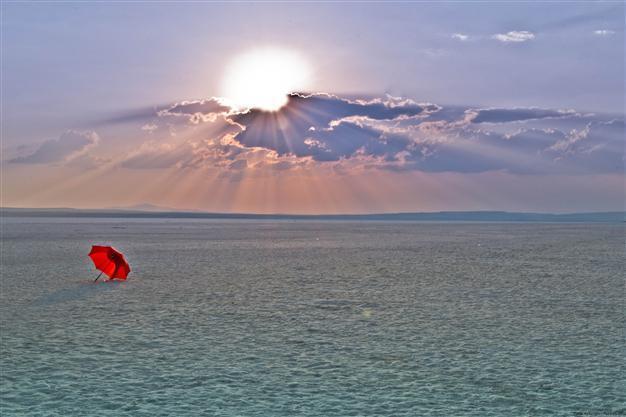Ailing Lake Tuz in no danger and not drying up, according to forestry minister
TEKİRDAĞ

Lake Tuz is a protected area and a first-degree natural site, known for the natural beauty of its salt dunes. HÜRRİYET Photo
Turkey’s forestry and water affairs minister has brushed aside concerns and scientific analyses regarding the drought threatening the salty Lake Tuz in Central Anatolia, the country’s second largest lake and one of its most important ecological features.The lake, which has shrunk to 50 percent of its original size over the last 40 years, is only experiencing a “periodic and temporary drought,” according to Minister Veysel Eroğlu, who solemnly declared that the government “is in control of [the situation at] the lake.”
“Turkey is located in a semi-arid region. There are dry periods every seven years. We experienced it in 1994, in 2007 and now in 2014. There has been a drop of about 15-20 percent in rainfall, but rainfall has started again now,” Eroğlu said on Oct. 7 during a visit to the western province of Tekirdağ, stressing that there was “no need to worry.”
“Lake Tuz leaves salt layers during the dry season due to evaporation. But now that rains have started again, we don’t see any danger,” he added.
Despite the lake being a protected area and a first-degree natural site, known for the natural beauty of its salt dunes, dozens of companies are operating along its shores to produce salt, thus damaging the entire ecosystem. A recent decision to allow 10 new companies to produce salt in the area prompted huge criticism among environmental activists, who warned that the overuse of the lake’s resources could amount to its death sentence.
Alongside the striking white patterns of its salt, the lake is also home to one of the world’s largest flamingo colonies.
Speaking on the same visit to Tekirdağ, Eroğlu also praised the government’s work regarding water sources, despite being under fire due to its policy on hydroelectric plants.
“We have done many works to revive and protect wetlands that have dried in the past. We have saved many lakes,” he said.
His remarks come two months after scientists said up to 99 percent of Lake Meke, another Central Anatolian lake, had dried up. Lake Sapanca in the province of Sakarya, east of Istanbul, has also witnessed an alarming drop in its water levels, while activists have mobilized to save Lake Burdur, which has lost a third of its waters over the last 35 years.
















